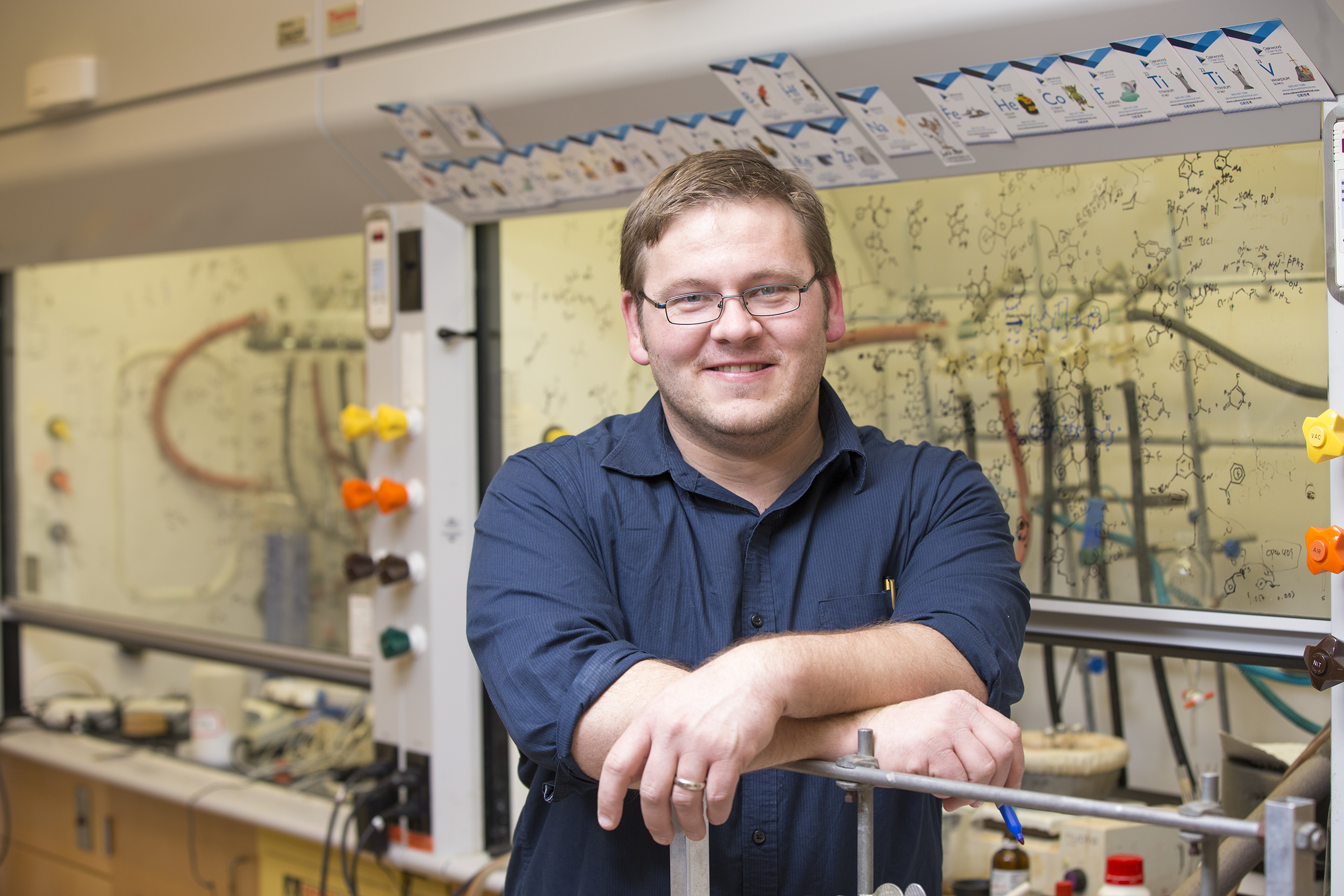Oklahoma State University associate chemistry professor Jimmie Weaver enthusiastically describes his work building synthetic molecules as “elegant,” “remarkable” and “robust.” His descriptions characterize the properties of molecules he’s made in the laboratory that are building blocks of many of the most successful pharmaceuticals and other chemical products. From that enthusiasm, and an entrepreneurial spirit, a business was born.
Weaver and partner Joel Roark have taken that success in the laboratory and gone commercial. The pair have launched Weaver Labs LLC to produce and sell commercial-grade chemical compounds to pharmaceutical, agribusiness, materials and other companies in need of the expertise.
“At the heart of it, what we do is develop innovative solutions, most of which have grown out of chemistry we’ve developed in the laboratory here at OSU, and apply those solutions to real-world needs,” Weaver said.
Carbon-fluorine bonds
Before joining OSU’s Department of Chemistry in 2012, Weaver earned a doctorate at the University of Kansas and completed a postdoctoral fellowship at Yale University. At OSU, his work led to a novel technique to synthesize complex molecules with carbon-fluorine bonds, giving those molecules what he describes as “remarkable” properties.
For example, molecules with robust carbon-fluorine bonds improve the therapeutic benefits of many valuable pharmaceuticals. Such molecules reduce the oxidative degradation of a drug, which is a defense mechanism used by the body to remove foreign compounds, even beneficial ones like medicines. The use of fluorinated molecules as pharmaceutical building blocks is responsible for the commercial success of many blockbuster drugs, like the cholesterol treatment Lipitor and type 2 diabetes drug Januvia.
Almost without exception, molecules with carbon-fluorine bonds do not exist in nature and as a result must be synthesized in the laboratory. But building them using traditional chemistry methods is difficult, expensive and sometimes impossible, hurting their commercial value. Facing this problem, Weaver discovered groundbreaking solutions.
Weaver developed a suite of new chemical reactions that allow access to key fluorinated molecules cheaply and easily. The pioneering process allows Weaver Labs to produce industry-grade fluorinated compounds in the quantities needed. Weaver’s breakthrough attracted a lot of attention from pharmaceutical and agrochemical companies and laid the foundation for Weaver Labs LLC.
“We’re now recognized worldwide as experts in synthesizing fluorinated molecules,” Weaver said.
Roark, a 1989 OSU electrical engineering alumnus, brings years of experience to the partnership, including co-founding Nomadics Inc. in Stillwater in 1995. The company developed explosives sensors for the defense industry and grew to employ more than 200 people. Nomadics was such a success that a larger entity snapped it up in 2010. Roark eventually left the company and began looking for new opportunities. That’s when he met Weaver.
“My background is in technology-development startups, and I had been on the lookout for potential technologies through my involvement with the OSU Research Foundation,” Roark said.
Commercial appeal
Roark could see the commercial potential in Weaver’s synthetic chemistry advances. The potential was not lost on Weaver, either. He needed help getting a business off the ground and managing its growth and operations. Roark stepped in with entrepreneurial know-how while initial funding came from an investor in the OSU family.
Weaver Labs received $175,000 this spring from OSU Research Foundation’s Cowboy Technologies, which invests in new businesses seeking to commercialize technology owned and licensed from the university. Cowboy Technologies Executive Director Daniel Will said Roark and Weaver are on the right path to building a successful business.
“Weaver Labs has its bases covered with a strong technology-to-market match and talented founders who can execute their business model,” Will said. “That makes them a good investment.”
The new company is headquartered at the Meridian Technology Center for Business Development in Stillwater, where a lab is being set up. Anuradha Singh, a former postdoctoral fellow in Weaver’s lab, was hired as the first employee soon after the company’s launch in June. Despite spending countless hours building the business, neither Roark nor Weaver accepts a paycheck yet.
‘Idea business’
Weaver and Roark see Weaver Labs as not only a producer of fluorinated compounds, but also a developer of intellectual property, which is the ownership of information and intellectual innovation underlying a technology. Much of the IP behind Weaver’s development of chemical compounds is owned by OSU. In the future, Roark said the business will expand into new areas that match the lab’s expertise.
“We want to be in the materials business and we want to be in the idea business by creating our own intellectual property,” Roark said.
Another technology Weaver Labs has developed and patented is the synthesis of phosphorescent compounds used in digital displays like smartphone screens. Weaver says the market for organic light-emitting diodes is large and growing quickly.
Roark said his experience has shown that building a successful business is a process of trial and error, watching and waiting, not unlike what a baseball player goes through.
“In a game, every time you put the ball in play, you run as hard as you can to first base and then you see what happens,” Roark said. “Sometimes, you’re going to hit one in the gap and you get to run the bases.”

